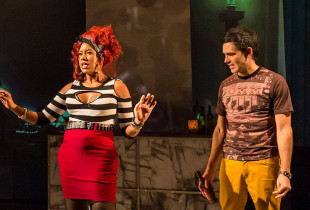Playwrights, Professors, a Politician, and a UFO Researcher Meet at the L.A. Writers' Workshop


The weekend of November 5–6, 2016 marked the kickoff of Center Theatre Group’s 2016/17 Los Angeles Writers’ Workshop. The seven participating playwrights came together at the Kirk Douglas Theatre for a Salon weekend featuring conversations with local experts—selected by the playwrights individually—on the subjects of their plays. We asked playwright Eliza Clark for her reflections on the experience and what’s ahead.
The question I’m asking myself this Monday morning about our Salon weekend is not “how useful will this weekend prove to be in writing my play?” but rather, “how will I ever do it any other way?”
There is something so magical about the meaning created through juxtaposition. Though we spent the weekend listening to very different experts talk about very different subjects, I would bet that I am not the only playwright who came away stimulated creatively by a subject or a person who was not “intended” for me. Over the course of the weekend we heard from feminists, professors, Vietnam historians, a politician, business owners, immigrants, a death and grieving expert, a scientist, a therapist specializing in scrupulosity (a specific form of OCD that centers on morality and religion), a reparative justice facilitator, a UFO researcher, and a hypnotherapist who formed a support group for alien abductees/experiencers (those last two were mine).
By juxtaposing these different subjects, connections began to emerge. We spent a lot of the weekend thinking about redemption, about the stickiness (and occasional selfishness) of seeking forgiveness. We thought about the power of “me too,” the desire to be a part of a community, and then to protect and defend that community once you are a part of it. We talked about silence, the power of what is said and unsaid. It was passionately argued by a person who seemed to really know what he was talking about that human life on earth will end sometime in the next 100 to 10,000 years, and yet here we all are, trying to create meaning in the face of our own mortal deaths and the demise of the human race. In spite of its morbidity, the weekend was strangely uplifting.
We kept coming back to the search for meaning. How do people make sense of traumatic events? How do people view themselves through the lens of their personal and family history? How do communities cope with harm through storytelling? How do we use narrative to make sense of senseless things like death? How is “fate,” “destiny,” “God,” “Theatre,” a function of our human need to explain the inexplicable? How do people who are in possession of cold, hard, scientific fact still find meaning in the random circumstances that make up a life?
I did not know any of my fellow playwrights personally (though I had heard of all of them and seen and read some of their work) when I showed up on Saturday morning, but by Sunday evening, I felt a strong kinship and sense of community. Our experts were sharing their passions and their lives with us, and on more than one occasion I found myself blurting out my own secrets in an effort to connect. I could not be more excited to be spending the year with these people. And I’m more excited than ever to begin work on my play.
Eliza Clark is a producer and writer, known for "One Life to Live (1968)," "The Killing (2011)," and "Extant (2014)."
Related Articles
L.A. Writers' Workshop
The L.A. Writers' Workshop invites seven local playwrights to spend a year researching and writing a new work while receiving feedback from their fellow writers and Center Theatre Group staff.
Learn More